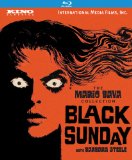| Reviews & Columns |
|
Reviews DVD TV on DVD Blu-ray 4K UHD International DVDs In Theaters Reviews by Studio Video Games Features Collector Series DVDs Easter Egg Database Interviews DVD Talk Radio Feature Articles Columns Anime Talk DVD Savant Horror DVDs The M.O.D. Squad Art House HD Talk Silent DVD
|
DVD Talk Forum |
|
|
| Resources |
|
DVD Price Search Customer Service #'s RCE Info Links |
|
Columns
|
|
|
Black Sunday
Lorber // Unrated // September 18, 2012
List Price: $24.95 [Buy now and save at Amazon]
The Film:
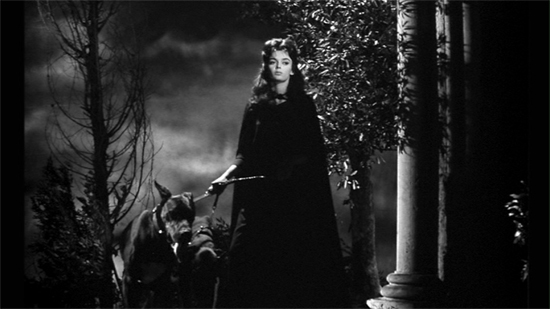
Billowing torches and fire pits, shadows cast by knotted trees, and an eerie voiceover describing the ritualistic "cleansing" of satanic sympathizers adorn the first minutes of Black Sunday (also known as The Mask of Satan, or La maschera del demonio), the debut feature film from Italian horror icon Mario Bava. Setting the tone for what's to come in an ominous tale of family curses and demonic enchantment, the scenes that follow drip in gothic atmosphere that not only fixates on unsettling images, but also tells a story almost as clearly as the context itself -- as they should, given Bava's experience behind the camera. Not until a statuesque, ghostly figure emerges in the crumbled ruins of a church does this classic truly take flight, though, where Barbara Steele's mesmerizing presence reveals the form of what'll become one of the finest, earliest examples of an effective female villainess in horror's annals. The appeal cannot be easily denied, where her presence among the obscure, antiquated atmosphere of dark silhouettes and craggy crypts still mesmerizes with every frame.
Loosely adapting the ideas and structure from a Russian short story, Nikolai Gogol's Viy, Black Sunday revolves around a family curse that dates back centuries before the events that transpire in the film's central 19th-Century setting. Just before being burned at the stake by her brother for practicing sorcery, Asa Vajda (Steele) puts a curse on their family, swearing revenge for her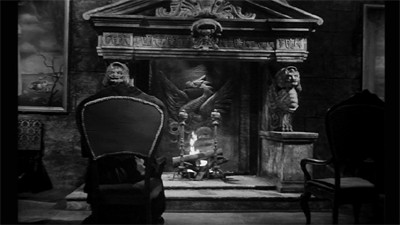 death and that of her lover and co-practitioner, Javuto (Ivo Garrani). Jump ahead two centuries, where Dr. Kruvajan (Andrea Checchi) and his assistant, Dr. Gorbarec (John Richardson), explore the ruins of a cathedral while waiting for their carriage to be repaired. While there, they stumble onto the crypt of Asa Vajda, whose body -- aside from some decay and critters crawling through her skull -- appears remarkably preserved underneath the death mask stapled to her head. Yet when they exit the crypt, and after Dr. Kruvajan accidentally drips blood onto the corpse's face, they're greeted by a stunningly woman: Katia, who perfectly resembles the witch-vampire Asa from head to toe.
death and that of her lover and co-practitioner, Javuto (Ivo Garrani). Jump ahead two centuries, where Dr. Kruvajan (Andrea Checchi) and his assistant, Dr. Gorbarec (John Richardson), explore the ruins of a cathedral while waiting for their carriage to be repaired. While there, they stumble onto the crypt of Asa Vajda, whose body -- aside from some decay and critters crawling through her skull -- appears remarkably preserved underneath the death mask stapled to her head. Yet when they exit the crypt, and after Dr. Kruvajan accidentally drips blood onto the corpse's face, they're greeted by a stunningly woman: Katia, who perfectly resembles the witch-vampire Asa from head to toe.
Time kind of stands still once Barbara Steele emerges underneath the gloomy clouds and crumbled ruins -- partly because of the curiosity about her doppelganger likeness to Asa, but mostly because of how exquisitely the actress wears the shadows and stones around her. Black Sunday exudes this ominous mood around the two manifestations of the character that Steele embodies; Katia's haunted, innocent gazes leave one unnerved by the girl's place in the ancient curse of her ancestor, while the grotesque, mangled visages of Asa in her crypt -- and outside of it -- create their own intimidating presence. Bava relishes the look in her eyes, a consistent visual motif in the film, where the desperation and unease in one filters into the fiendish, ancient concentration in the other. The villainous side of Steele transformed her into one of the key faces of horror in the '60s, as her ability to titillate and revile becomes one of the earliest expressions of a beguiling, disturbing female antagonist.
The visual tempo Bava wraps around Barbara Steele is what drives Black Sunday, a distinctive black-and-white infusion of modern gore with nods to German Expressionism and Hammer Films' productions of the '50s. Gargoyles, gnarled stone walls, gloomy paintings and obscuring shadows blanket every scene, shot in and around an Italian castle to capture a properly antiquated aesthetic around the accursed Vajda family. The exposition-heavy script -- well, all the pieces of the script, written day-by-day -- forces out stories of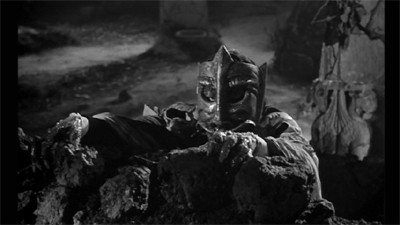 vampirism, the curse's history, and Katia's desire to separate from her family, but the evocative images Bava orchestrates invoke so much bleak, brooding life that the context almost seems redundant at times. Human interaction isn't the film's strong suit, where forced dialogue elucidates certain elements, but the bleak aura clouding the castle, misty swamplands, and ominous graveyards engulfs the senses to such a profound degree that the blunt-force frankness is almost a welcome wake-up call from that gloomy trance.
vampirism, the curse's history, and Katia's desire to separate from her family, but the evocative images Bava orchestrates invoke so much bleak, brooding life that the context almost seems redundant at times. Human interaction isn't the film's strong suit, where forced dialogue elucidates certain elements, but the bleak aura clouding the castle, misty swamplands, and ominous graveyards engulfs the senses to such a profound degree that the blunt-force frankness is almost a welcome wake-up call from that gloomy trance.
Bava gradually allows the mysteries of Black Sunday to emerge from those shadows, and as he pulls the curtain back on its curios, the images he concocts evoke more and more of a nightmarish vibe. This isn't a film designed for overt scares, where images of fraught carriages trips through the night, scorpions and maggots crawling in and on faces, and the piercing eyes adorning a face of rotting flesh slowly curdle the blood instead of provoke punchy terror. Instead, it lures those watching into this inventive crescendo of macabre revelations about what the horrors of the Vajda curse truly entail, one that alludes to the artful terrors of '30s horror cinema as Katia and Asa's connection comes full-circle. Audiences' thresholds have been vigorously tested since the '60s by shocking displays of violence and gore, yet those final images of Barbara Steele -- wide-eyed, scheming, and alarming -- entwined in satanic schemes and surrounded by the gothic structures of Bava's vision still have the enormously uncanny ability of sending shivers down the spine.
The Blu-ray:
Video and Audio:
Looming under the darkness of this Blu-ray lays an often-striking treatment of Mario Bava's classic, properly framed at a 1.66:1 aspect ratio for this 1080p transfer that's been stricken from an archived 35mm print. Complex silhouettes, flickering shadows, and gothic minutiae are crammed into every frame of Black Sunday, and the richness of black levels here is astounding, if a bit too heavy: deep voids of inky darkness often drape over faces and swallow up details in the background, mostly reflective of Bava's expressionistic intents and respectful of natural contrast responsiveness (though occasionally guilty of some egregious black crush). The image consistently carries a rich, film-like appearance to its grain structure and composition -- down to an unfortunate frequency of dust and debris -- while also allowing some eye-catching details to creep up, like the weave of a spider's web and the sheen on the devil masks. While some scenes appear hazier than one might expect, and the jitters of the image frequently disrupt one's immersion in the overall aesthetic, it's a mighty admirable outing from Kino that harnesses Bava's gritty intents rather well in HD.
It's tough to really place judgment on the 2-channel Mono PCM track that accompanies Black Sunday: it's moderately clear but verbal delivery isn't all that robust, and the film's age can be perceived at most points. The advancement is marginal over the Dolby Digital track, that same slightly-off English dubbing on the Anchor Bay DVD, but it certainly retains its perspective; the cracks of thunder and gusts of wind possess throaty bass; the echoes of Barbara Steele's voice stretches across the channel separation; and the moody piano-heavy tunes rings rather true within its age-limited constraints. Where you can hear its quality is in the quieter scenes where stillness in the air becomes paramount, and this track lets the unease hang in the atmosphere will little distortion. Optional English subtitles are available.
Special Features:
Fans of Black Sunday will be familiar with the special features Kino Films have supplied, namely the in-depth, often highly-regarded Audio Commentary with Tim Lucas. Ignoring the long pauses in the material, it's a really intriguing analysis: Lucas offers point-blank facts about Bava's artistic intentions, the somewhat tumultuous dealings with Barbara Steele on-set, and how the crew achieved several of the visual effects (carriage rides, Asa's fabricated head, the difficulties of shot involving a man rising from underground, etc.) But he also interjects his own speculation and interpretation, such the arrangement of certain scenes and why Barbara Steele's performance varies as Katia.
Kino also spooks up three trailers for Black Sunday: the US Trailer (2:06, SD), the International Trailer for "The Mask of Satan" (3:26, SD), and a short TV Spot (:21, SD).
Final Thoughts:
Mario Bava would go on to direct several heavy-hitters in the standard horror and giallo horror genres after directing Black Sunday, but his story of doppelgangers, demonic curses, and gothic atmosphere -- all swirling around a matchless Barbara Steele -- remains one of his more enduring and influential pieces of work. Style may engulf substance here, where the coarse textures and oppressive shadows of an Italian castle play host to an ancient vampiric curse, but Bava exploits in creating this tense and atmospheric experience. He provokes the senses with images that still rattle the senses when observed, while the captivating gaze and harrowing mannerisms of the leading lady are really something to behold. Indulge in one of the great midnight movies, especially over Halloween -- and especially by way of Kino Classics' Blu-ray, which sports the same special features in a robust and satisfying audiovisual package. Highly Recommended.
Note: Still shots in this review are from Anchor Bay's DVD, and do not represent the Blu-ray reviewed here.
Thomas Spurlin, Staff Reviewer -- DVDTalk Reviews | Personal Blog/Site

Billowing torches and fire pits, shadows cast by knotted trees, and an eerie voiceover describing the ritualistic "cleansing" of satanic sympathizers adorn the first minutes of Black Sunday (also known as The Mask of Satan, or La maschera del demonio), the debut feature film from Italian horror icon Mario Bava. Setting the tone for what's to come in an ominous tale of family curses and demonic enchantment, the scenes that follow drip in gothic atmosphere that not only fixates on unsettling images, but also tells a story almost as clearly as the context itself -- as they should, given Bava's experience behind the camera. Not until a statuesque, ghostly figure emerges in the crumbled ruins of a church does this classic truly take flight, though, where Barbara Steele's mesmerizing presence reveals the form of what'll become one of the finest, earliest examples of an effective female villainess in horror's annals. The appeal cannot be easily denied, where her presence among the obscure, antiquated atmosphere of dark silhouettes and craggy crypts still mesmerizes with every frame.
Loosely adapting the ideas and structure from a Russian short story, Nikolai Gogol's Viy, Black Sunday revolves around a family curse that dates back centuries before the events that transpire in the film's central 19th-Century setting. Just before being burned at the stake by her brother for practicing sorcery, Asa Vajda (Steele) puts a curse on their family, swearing revenge for her
 death and that of her lover and co-practitioner, Javuto (Ivo Garrani). Jump ahead two centuries, where Dr. Kruvajan (Andrea Checchi) and his assistant, Dr. Gorbarec (John Richardson), explore the ruins of a cathedral while waiting for their carriage to be repaired. While there, they stumble onto the crypt of Asa Vajda, whose body -- aside from some decay and critters crawling through her skull -- appears remarkably preserved underneath the death mask stapled to her head. Yet when they exit the crypt, and after Dr. Kruvajan accidentally drips blood onto the corpse's face, they're greeted by a stunningly woman: Katia, who perfectly resembles the witch-vampire Asa from head to toe.
death and that of her lover and co-practitioner, Javuto (Ivo Garrani). Jump ahead two centuries, where Dr. Kruvajan (Andrea Checchi) and his assistant, Dr. Gorbarec (John Richardson), explore the ruins of a cathedral while waiting for their carriage to be repaired. While there, they stumble onto the crypt of Asa Vajda, whose body -- aside from some decay and critters crawling through her skull -- appears remarkably preserved underneath the death mask stapled to her head. Yet when they exit the crypt, and after Dr. Kruvajan accidentally drips blood onto the corpse's face, they're greeted by a stunningly woman: Katia, who perfectly resembles the witch-vampire Asa from head to toe. Time kind of stands still once Barbara Steele emerges underneath the gloomy clouds and crumbled ruins -- partly because of the curiosity about her doppelganger likeness to Asa, but mostly because of how exquisitely the actress wears the shadows and stones around her. Black Sunday exudes this ominous mood around the two manifestations of the character that Steele embodies; Katia's haunted, innocent gazes leave one unnerved by the girl's place in the ancient curse of her ancestor, while the grotesque, mangled visages of Asa in her crypt -- and outside of it -- create their own intimidating presence. Bava relishes the look in her eyes, a consistent visual motif in the film, where the desperation and unease in one filters into the fiendish, ancient concentration in the other. The villainous side of Steele transformed her into one of the key faces of horror in the '60s, as her ability to titillate and revile becomes one of the earliest expressions of a beguiling, disturbing female antagonist.
The visual tempo Bava wraps around Barbara Steele is what drives Black Sunday, a distinctive black-and-white infusion of modern gore with nods to German Expressionism and Hammer Films' productions of the '50s. Gargoyles, gnarled stone walls, gloomy paintings and obscuring shadows blanket every scene, shot in and around an Italian castle to capture a properly antiquated aesthetic around the accursed Vajda family. The exposition-heavy script -- well, all the pieces of the script, written day-by-day -- forces out stories of
 vampirism, the curse's history, and Katia's desire to separate from her family, but the evocative images Bava orchestrates invoke so much bleak, brooding life that the context almost seems redundant at times. Human interaction isn't the film's strong suit, where forced dialogue elucidates certain elements, but the bleak aura clouding the castle, misty swamplands, and ominous graveyards engulfs the senses to such a profound degree that the blunt-force frankness is almost a welcome wake-up call from that gloomy trance.
vampirism, the curse's history, and Katia's desire to separate from her family, but the evocative images Bava orchestrates invoke so much bleak, brooding life that the context almost seems redundant at times. Human interaction isn't the film's strong suit, where forced dialogue elucidates certain elements, but the bleak aura clouding the castle, misty swamplands, and ominous graveyards engulfs the senses to such a profound degree that the blunt-force frankness is almost a welcome wake-up call from that gloomy trance. Bava gradually allows the mysteries of Black Sunday to emerge from those shadows, and as he pulls the curtain back on its curios, the images he concocts evoke more and more of a nightmarish vibe. This isn't a film designed for overt scares, where images of fraught carriages trips through the night, scorpions and maggots crawling in and on faces, and the piercing eyes adorning a face of rotting flesh slowly curdle the blood instead of provoke punchy terror. Instead, it lures those watching into this inventive crescendo of macabre revelations about what the horrors of the Vajda curse truly entail, one that alludes to the artful terrors of '30s horror cinema as Katia and Asa's connection comes full-circle. Audiences' thresholds have been vigorously tested since the '60s by shocking displays of violence and gore, yet those final images of Barbara Steele -- wide-eyed, scheming, and alarming -- entwined in satanic schemes and surrounded by the gothic structures of Bava's vision still have the enormously uncanny ability of sending shivers down the spine.
The Blu-ray:
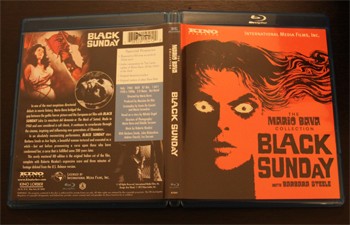 | 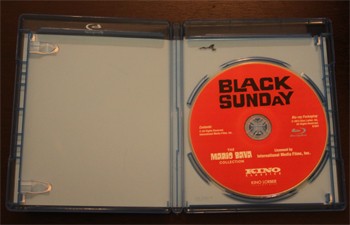 |
Video and Audio:
Looming under the darkness of this Blu-ray lays an often-striking treatment of Mario Bava's classic, properly framed at a 1.66:1 aspect ratio for this 1080p transfer that's been stricken from an archived 35mm print. Complex silhouettes, flickering shadows, and gothic minutiae are crammed into every frame of Black Sunday, and the richness of black levels here is astounding, if a bit too heavy: deep voids of inky darkness often drape over faces and swallow up details in the background, mostly reflective of Bava's expressionistic intents and respectful of natural contrast responsiveness (though occasionally guilty of some egregious black crush). The image consistently carries a rich, film-like appearance to its grain structure and composition -- down to an unfortunate frequency of dust and debris -- while also allowing some eye-catching details to creep up, like the weave of a spider's web and the sheen on the devil masks. While some scenes appear hazier than one might expect, and the jitters of the image frequently disrupt one's immersion in the overall aesthetic, it's a mighty admirable outing from Kino that harnesses Bava's gritty intents rather well in HD.
It's tough to really place judgment on the 2-channel Mono PCM track that accompanies Black Sunday: it's moderately clear but verbal delivery isn't all that robust, and the film's age can be perceived at most points. The advancement is marginal over the Dolby Digital track, that same slightly-off English dubbing on the Anchor Bay DVD, but it certainly retains its perspective; the cracks of thunder and gusts of wind possess throaty bass; the echoes of Barbara Steele's voice stretches across the channel separation; and the moody piano-heavy tunes rings rather true within its age-limited constraints. Where you can hear its quality is in the quieter scenes where stillness in the air becomes paramount, and this track lets the unease hang in the atmosphere will little distortion. Optional English subtitles are available.
Special Features:
Fans of Black Sunday will be familiar with the special features Kino Films have supplied, namely the in-depth, often highly-regarded Audio Commentary with Tim Lucas. Ignoring the long pauses in the material, it's a really intriguing analysis: Lucas offers point-blank facts about Bava's artistic intentions, the somewhat tumultuous dealings with Barbara Steele on-set, and how the crew achieved several of the visual effects (carriage rides, Asa's fabricated head, the difficulties of shot involving a man rising from underground, etc.) But he also interjects his own speculation and interpretation, such the arrangement of certain scenes and why Barbara Steele's performance varies as Katia.
Kino also spooks up three trailers for Black Sunday: the US Trailer (2:06, SD), the International Trailer for "The Mask of Satan" (3:26, SD), and a short TV Spot (:21, SD).
Final Thoughts:
Mario Bava would go on to direct several heavy-hitters in the standard horror and giallo horror genres after directing Black Sunday, but his story of doppelgangers, demonic curses, and gothic atmosphere -- all swirling around a matchless Barbara Steele -- remains one of his more enduring and influential pieces of work. Style may engulf substance here, where the coarse textures and oppressive shadows of an Italian castle play host to an ancient vampiric curse, but Bava exploits in creating this tense and atmospheric experience. He provokes the senses with images that still rattle the senses when observed, while the captivating gaze and harrowing mannerisms of the leading lady are really something to behold. Indulge in one of the great midnight movies, especially over Halloween -- and especially by way of Kino Classics' Blu-ray, which sports the same special features in a robust and satisfying audiovisual package. Highly Recommended.
Note: Still shots in this review are from Anchor Bay's DVD, and do not represent the Blu-ray reviewed here.
|
| Popular Reviews |
| Sponsored Links |
|
|
| Sponsored Links |
|
|
| Release List | Reviews | Shop | Newsletter | Forum | DVD Giveaways | Blu-Ray | Advertise |
|
Copyright 2024 DVDTalk.com All Rights Reserved. Legal Info, Privacy Policy, Terms of Use,
Manage Preferences,
Your Privacy Choices | |||||||









